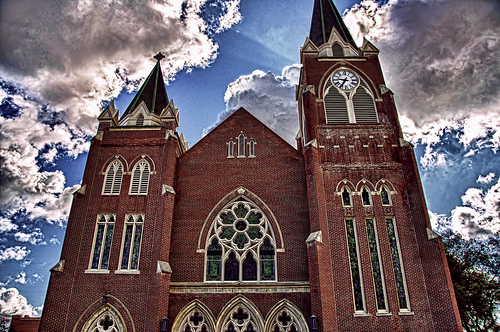We run our website the way we wished the whole internet worked: we provide high quality original content with no ads. We are funded solely by your direct support. Please consider supporting this project.
What Kind of Sinners Feel Welcomed by Your Church?
Perhaps the greatest indictment on evangelical churches today is that they are not generally known as refuge houses for sinners—places where hurting, wounded, sinful people can run and find love that does not question, an understanding that does not judge, and an acceptance that knows no conditions.
To be sure, evangelical churches are usually refuge houses for certain kinds of sinners—the loveless, the self-righteous, those apathetic toward the poor and unconcerned with issues of justice and race, the greedy, the gluttonous, and so on. People guilty of these sins usually feel little discomfort among us. But evangelical churches are not usually safe places for other kinds of sinners—those whose sins, ironically, tend to be much less frequently mentioned in the Bible than the religiously sanctioned sins.
It is rare indeed that a drunkard, drug addict, or prostitute would think of going to church because he or she just needed to feel loved and accepted. These people may go to bars, fellow addicts, drug dealers, or pimps to find refuge and acceptance, but they would not go to a church. In fact, as with the Pharisees in Jesus’ day, the church has generally represented everything people with these kinds of sins want to avoid at all costs. It has most often represented nothing but condemnation for these people. Indeed, churches frequently cultivate a reputation for “cracking down” on sins that fall into their “unsanctioned sin” category. To fail to do this, many have assumed, is to compromise our reputation for being set apart for holiness.
The sins we declare ourselves to be against are invariably selected to not target ourselves. If we were consistent in cracking down equally on all sins, we’d be cracking down on ourselves more than on those outside the church. And if we retained a system of evaluating sin at all, sins such as impatience, unkindness, rudeness, and self-righteousness—all indications that love is absent (1 Cor 13:4-5)—as well as prevalent “church” sins such as gossip, greed, and apathy would rank higher on our list than sins such as homosexuality or heterosexual promiscuity.
Striving for a holy reputation is also self-serving because the whole enterprise is unconsciously designed as a strategy for getting life for ourselves. Though it is mostly unconscious—indeed, though we uniformly deny it—we are feeding ourselves with our devised sin lists. We feel righteous and secure that we are “in” while others are “out” as we compare ourselves favorably with others who don’t measure up (according to our own biased measuring devise).
Above all else, love is that for which the church is called to be known. Sadly, in the name of acquiring for ourselves a reputation of holiness, we have often compromised the one reputation God calls us to have. Jesus was willing to forsake any possibility of having a holy reputation for the sake of loving those who were unholy.
To be sure, Christians are called to be a holy people, set apart by their good works. This is what transforming love looks like as it takes hold of people. But this is not a reputation we should seek to acquire or protect. The one reputation we are called to acquire is identical to the one reality we are called to live in: We are to be, and to be known as, a people who receive and give love in an outrageous, impartial, unconditional way.
—Adapted from Repenting of Religion, 102-104.
Category: General
Tags: Church, Homosexuality, Judgment, Kingdom Living, Repenting of Religion, Sin, Sinners
Related Reading

Generous Grace
Michelle Brea via Compfight Mark McIntyre wrote a piece on his blog called Selective Grace that highlights the ways in which the church tends to more easily demonstrate grace with some than with others. It’s a call to a more generous grace that does not distinguish between particular sins or particular differences in belief. How…

Everybody’s Got a Prequel
My wife and I, along with some friends, recently attended the Broadway Play Wicked. Without giving too much away, I’ll tell you the play attempts to answer the question: What could have possibly made the “Wicked Witch of the West” so [apparently] evil (as presented in the original Wizard of Oz)? After all, normal young…

The Religionless Church of the Future
“The time when men could be told everything by means of words, whether theological or simply pious, is over, and so is the time of…religion as such.… [W]hat is religionless Christianity?… What is the significance of a Church… in a religionless world?” Deitrich Bonhoeffer, Letter From Prison, April 30th, 1944. The Crisis of a…

Are we called to suffering?
What does it mean when we say we’re called to suffering? Does it mean that we should allow ourselves to be victimized or that God approves when we are abused? Here are Greg’s thoughts on this topic.

The Challenge of Malala to the Church
http://youtu.be/f506lCk6Tos I don’t know if you’ve seen this, but it’s Malala Yousafzai appearing on Jon Stewart’s The Daily Show. At the age of 14 Malala was shot in the face at point blank range by the Taliban while riding to school on a bus, all because she wouldn’t stop speaking up for the right of…

Costly Discipleship
Bob AuBuchon via Compfight Zack Hunt over at The American Jesus is doing a series of posts called “Blogmatics” in which he fleshes out the theological assumptions that inform his blog posts. A couple of days ago he discussed discipleship and the life that believers are called to in a post entitled Blogmatics: The Cost…

